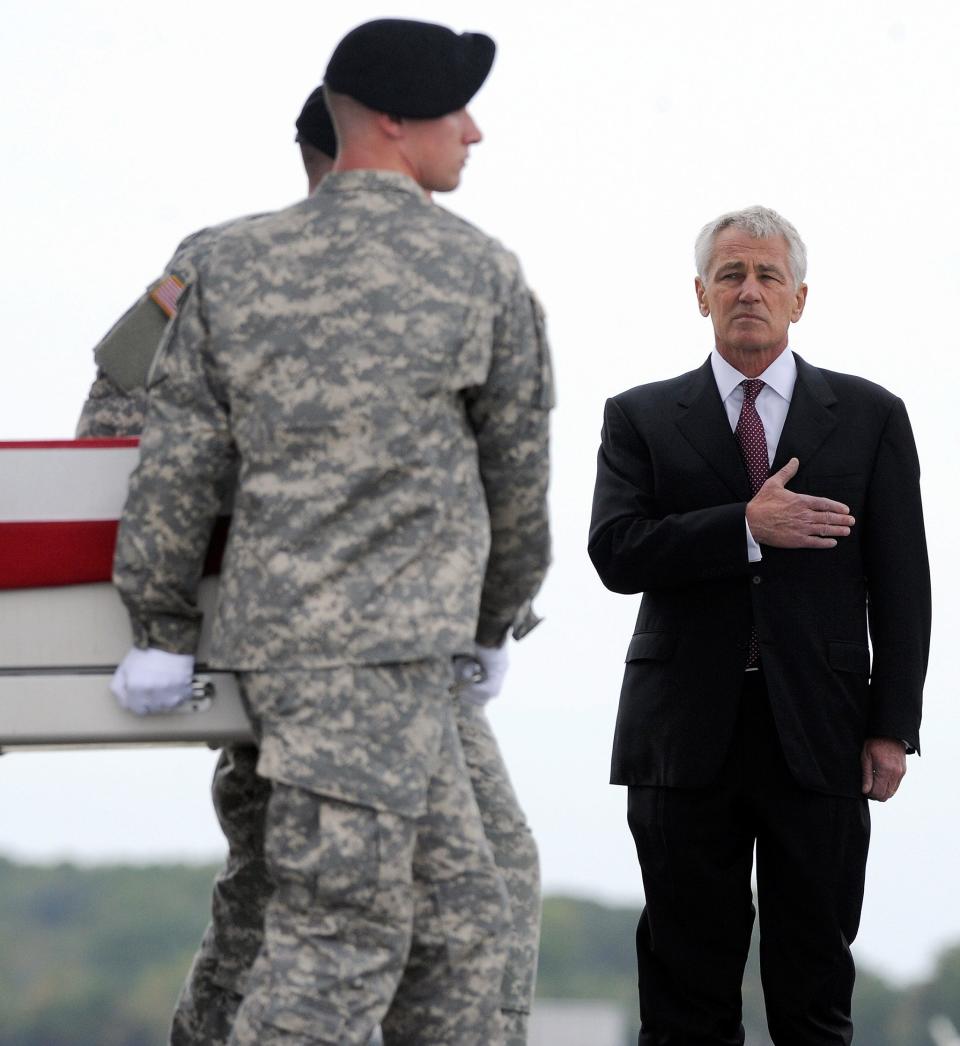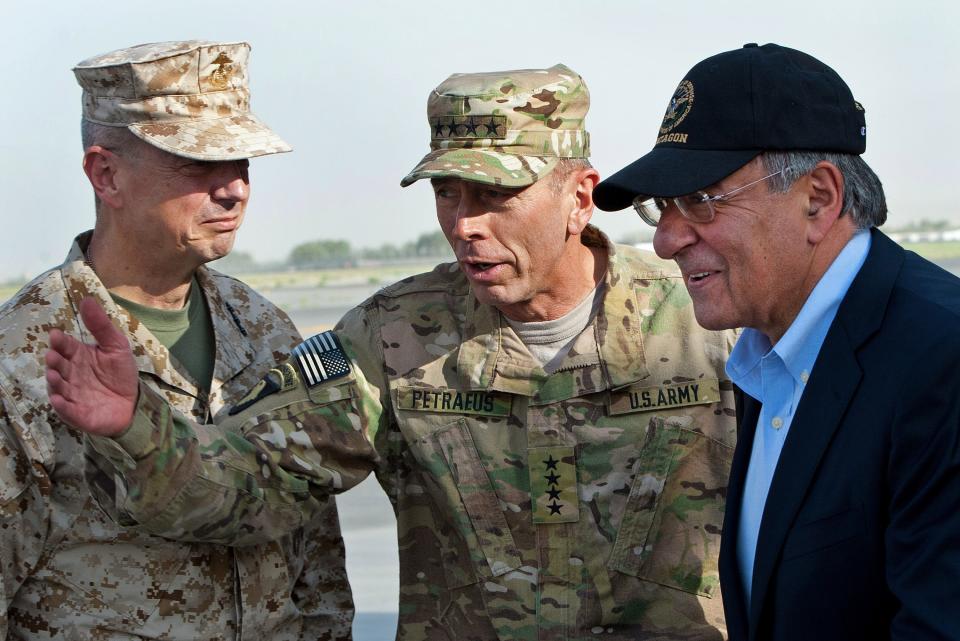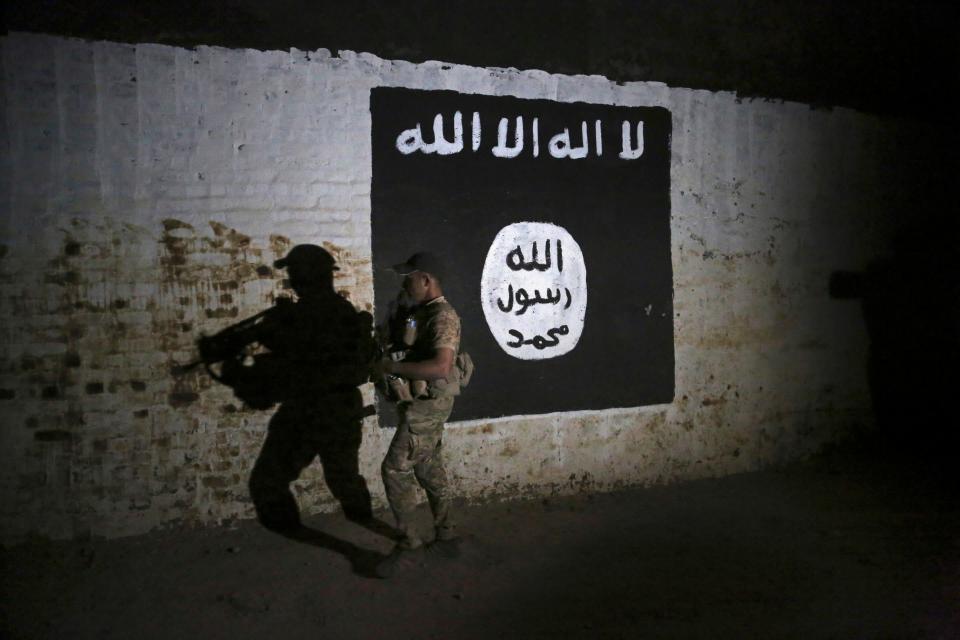Defense secretaries in their own words: US 'invented reasons' to stay in Afghanistan
- Oops!Something went wrong.Please try again later.
- Oops!Something went wrong.Please try again later.
- Oops!Something went wrong.Please try again later.
WASHINGTON – The Taliban blitz that seized Afghanistan in a few short weeks has exposed the failed 20-year American strategy in the war-torn country and portends terrorism hazards in the future for the United States, according to former defense secretaries.
Afghan security forces, trained and equipped at the cost of $83 billion, wilted before Taliban fighters. With few exceptions, the Taliban rolled through provincial capitals without a fight despite a force of Afghan troops that was supposed to number more than 300,000. In reality, there were far fewer Afghan forces because of desertions and commanders who reportedly pocketed the pay of ghost soldiers they had kept on rolls. For those who remained and fought, there wasn't enough ammunition and food, to say nothing of pay.
On Sunday, the Afghan security forces, an expensive house of cards built to U.S. specifications but ill-suited to the country, had collapsed. President Ashraf Ghani had fled the country. The capital, Kabul, had been surrounded by a lightly armed but tenacious force of militants. A desperate evacuation of U.S. personnel and their Afghan supporters had begun.
Former Defense Secretaries Chuck Hagel and Leon Panetta discussed what went wrong and what may happen next with USA TODAY.
Chuck Hagel: 'We stayed too long in Afghanistan'
After 9/11, U.S. airstrikes and a small contingent of American commandos on the ground – sometimes on horseback – helped local forces topple the Taliban. The militant movement had governed Afghanistan harshly for years and had sheltered Osama bin Laden and the al-Qaida terrorists who planned their U.S. attacks there.
Hagel, who was a U.S. senator during the years that followed, said the Foreign Relations Committee continually quizzed U.S. officials about the strategy for Afghanistan, a country without a history of a strong central government.
"We could never get a clear answer," Hagel said. "Nobody ever said, 'No, this is not nation-building.' It was always, 'We'll be through in another year or so.' So on and so on. Well, that got to be 20 years."
Officials "invented reasons" for continued U.S. involvement, Hagel said. He cited what had been a perennial campaign to develop alternatives to cultivating poppy, the source of heroin and the illicit profits for farmers and the Taliban. The U.S. State Department and the Defense Department sought solutions for years without success. Year after year, the Pentagon pumped billions into the Afghan Army and maintained that those forces were improving. Hagel was defense secretary when the U.S. officially ended its combat mission in 2014.
More: How did the Taliban retake Afghanistan so fast? What's happening now? What we know

At a congressional hearing in 2020 on lessons learned in Afghanistan, Rep. Eliot Engel blasted U.S. officials for misleading the American public on Afghanistan.
"Year after year we heard 'We are making progress,'" Engel said. "Year after year we were 'turning a corner.' Three successive administrations of both parties promised that we would avoid falling into a trap of nation-building in Afghanistan. And while presidents and military officials were painting a rosy picture, the reality on the ground was a consistently deepening quagmire with no end in sight. It is a damning record."
Hagel was equally blunt.
"We got into some real deception," Hagel said. "You go from this misrepresentation to another misrepresentation. And you get to the point where, in fact, you are lying, and everybody's covering for everybody else."
The result has been an unhealthy dependence on American might – and resentment of it, he said. A desperately poor country, Afghanistan had no means to afford a large, modern military force. Now it has dissolved.
"The fact is, for 20 years, the U.S has either been fighting the war for the Afghans or leading the effort, and training and support supporting their efforts. And they never, ever got weaned off of that."
More: Many fear Taliban will again end Afghan human rights, support terrorism
Hagel, a decorated combat veteran of the Vietnam War, drew parallels to the American defeat there. U.S. leaders in both countries failed to understand the historic and cultural context in which they operated and sought to remake the government and military in the American image.
"I was in one of those wars in Vietnam," Hagel said. "We stayed too long there. And we stayed too long in Afghanistan. We just took over everything. We took over their economic structure, certainly their security and military."
Hagel supports President Joe Biden's decision to withdraw from Afghanistan while acknowledging the humanitarian disaster that could follow under Taliban rule.
"There are a lot of consequences, unfair consequences, and a lot of people are going to lose their lives and get hurt by this," Hagel said. "But I don't see any other way. "It's not going to get better in a year, or two years or three years. It's one of these difficult, terrible, unfair situations."
Leon Panetta: Their 'principal goal' is attacking the US
Panetta, who preceded Hagel as defense secretary and had directed the CIA when bin Laden was killed in neighboring Pakistan, wanted a few thousand U.S. troops devoted to counterterrorism missions and others supporting Afghan security forces to remain in Afghanistan.

Pentagon officials have advocated that approach and sought to convince Biden that maintaining a presence there could prevent al-Qaida and other terror organizations like the Islamic State group from operating there. The Biden administration, however, has pointed out that terrorist groups have sprung up in Africa and elsewhere. Moreover, efforts to confront adversaries such as China and Russia are hindered by the drain on resources in Afghanistan.
Panetta said the U.S. doesn't have the luxury to choose where to confront its enemies.
"The Taliban will, in fact, allow al-Qaida and ISIS and other terrorists to develop and strengthen within Afghanistan," Panetta said. "That means that the United States is going to face a very difficult decision as to what to do when our national security becomes threatened. I don't think there's any question that if al-Qaida is able to reestablish, and if ISIS is able to strengthen, they have always had a principal goal of attacking the United States. That's the bottom line. And for that reason, I think that President Biden is going to have to face a very difficult decision as to what to do about it."
Panetta predicted that Biden may face the same dilemma then-President Obama had in 2014 when ISIS rolled through parts of Syria and Iraq. Obama, who had ordered the withdrawal of U.S. troops from Iraq in 2011, reversed course and directed the Pentagon to launch an air war against the militants. U.S. troops again returned, and about 2,500 remain in Iraq with another 900 in Syria.

This article originally appeared on USA TODAY: How Afghanistan collapsed: Chuck Hagel and Leon Panetta speak out

